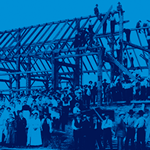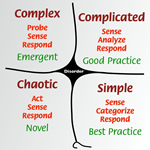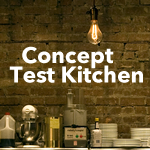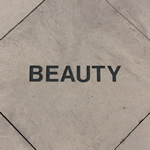There are countless ways to categorize collective human action (by legal entity, by sector, by formal/informal structure, by tax status, by geography, and on and on). But sociologist/political-scientist/historian Johan Galtung suggests there are essentially two types: thick-and-small (“the wheel” or “Beta”) and thin-and-big (“the pyramid” or “Alpha”).
Fostering intuition
One of the remarkable attributes of experts in a discipline or domain is how quickly they can assess and respond to a complex moment. In a flash, it seems, they cut through the noise, “see” the key components, and “read” the essential patterns that define the best range of response. Whether it’s a grandmaster chess […]
The Adjacent Possible
So much of leadership, management, and change narrative is about “gap analysis.” The thinking goes that we achieve a desired future by describing a bold vision, defining our current location, mapping the gap between here and there, and then planning and adjusting our route at check-points along the way.
Da Vinci’s BFF, the CPA
It’s common modern practice to consider art and commerce in opposition to each other, and artists and accountants as cartoonish polar opposites, as well. But it wasn’t always so. About 520 years ago, art and commerce, artist and accountant, lived with and learned from each other through the lives of Luca Pacioli and an up-and-comer […]
It’s complicated, or complex, or chaos, or…
The idea of “best practices” has always driven me a bit nuts. The world is full of complexity and context and interconnections, I figured. How could any “one way” or “single process” across many instances be “best”? In fact, how could it be anything more than a delusion? Sure, there are “fruitful paths” that seem […]
Concept Test Kitchen, Episode 2
The new episode of my “Concept Test Kitchen” explores the PAEI Code, a framework by Ichak Adizes to explore the four functions/concerns of management and their interplay and implications. Full details on this model are available in multiple places, but I’m drawing from the book Leading the Leaders, Adizes Institute, 2015.
Sovereignty or service
We often talk about an organization having a mission, as if the organization exists as some separate entity with its own individual will. But increasingly I’m wondering if that attribution hasn’t always been upside-down. Organizations don’t have missions. Missions have organizations. And when change is necessary, it’s important to know which changes which.
Concept Test Kitchen, Episode 1
I’m launching a new experiment with this pilot episode of “Concept Test Kitchen” — a video series presenting interesting frameworks or approaches to arts management (‘recipes for thinking’), so you can share back whether or when they may be useful. Watch below, or on YouTube. And let me know in the comments whether the recipes […]
Defusing beauty
My previous post suggested a multi-layered view of our work in arts organizations, including attention to the nouns of our ‘products’ or ‘outcomes,’ the verbs of our ‘processes’ or ‘practices,’ but also the core ‘source’ or ‘wellspring’ of the work that drives and inspires us. One obvious wellspring for many of us in the arts […]
The shallow breathing of rational management
So much of our training, theory, practice, and focus in cultural management has to do with outcomes and processes. When we look to improve how our organizations ‘work’, we tend to chose between ‘making better things’ (the outcomes or products), or ‘making things better’ (the processes that lead to those outcomes).









